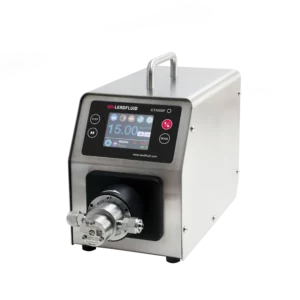Laboratory pumps are essential tools in scientific research, healthcare, and industrial settings, enabling precise and controlled fluid delivery. Among the various types of laboratory pumps, three key pump technologies have gained significant attention: micro peristaltic pumps, precision gear pumps, and stepper motor peristaltic pumps. Each of these pump technologies offers unique advantages and is suitable for specific applications. In this article, we will explore the features, benefits, and applications of these three pump types to help you make an informed decision when selecting a laboratory pump.

Micro Peristaltic Pumps: Precise and Gentle Fluid Handling
Micro peristaltic pumps are based on the principle of peristalsis, where a flexible tube is compressed by rotating rollers or a squeezing mechanism. This action creates a pulsating flow, allowing precise control over fluid delivery. Here are some key features and benefits of micro peristaltic pumps:
- Precision and Accuracy: Micro peristaltic pumps offer excellent precision and accuracy, making them ideal for applications that require precise dosing and delivery of fluids, such as microfluidics, cell culture, and chemical synthesis.
- Gentle Fluid Handling: The gentle pumping action of micro peristaltic pumps ensures minimal shear stress and maintains the integrity of sensitive fluids, such as live cells, proteins, and delicate chemicals.
- Compact and Portable: Micro peristaltic pumps are often compact and lightweight, making them suitable for portable and field applications where space is limited.
- Easy Tubing Replacement: The tubing used in micro peristaltic pumps can be easily replaced, minimizing the risk of cross-contamination and simplifying maintenance.
Applications: Micro peristaltic pumps find applications in microfluidics, biotechnology, medical diagnostics, pharmaceutical research, and any other field that requires precise and gentle fluid handling.
Precision Gear Pumps: Accurate and Consistent Flow Control
Precision gear pumps utilize precisely machined gears to deliver a constant and uniform flow of fluid. These pumps offer several advantages that make them suitable for specific applications:
- High Accuracy and Repeatability: Precision gear pumps provide precise and repeatable flow rates, making them ideal for applications that require consistent and controlled fluid delivery, such as metering, coating, and additive dosing.
- Wide Range of Viscosity Handling: Precision gear pumps can handle a wide range of viscosities, from low-viscosity solvents to high-viscosity fluids, making them versatile for various industrial and laboratory processes.
- Robust and Durable: Precision gear pumps are known for their durability and ability to handle demanding operating conditions, including high pressures and abrasive fluids.
Applications: Precision gear pumps are commonly used in industries such as chemical processing, pharmaceutical manufacturing, food and beverage, and printing, where precise and reliable fluid delivery is critical.
Stepper Motor Peristaltic Pumps: Precise and Programmable Fluid Delivery
Stepper motor peristaltic pumps combine the peristaltic pumping principle with the precise control of a stepper motor. These pumps offer unique advantages that make them suitable for specific applications:
- Accurate Flow Control: Stepper motor peristaltic pumps provide precise control over flow rates, allowing for programmable and customizable fluid delivery.
- Versatile Tubing Options: These pumps can accommodate various tubing materials and sizes, offering flexibility for different fluid types and flow requirements.
- Programmability and Automation: Stepper motor peristaltic pumps can be easily integrated into automated systems, enabling precise and automated fluid delivery processes.
Applications: Stepper motor peristaltic pumps are commonly used in laboratory automation, liquid handling systems, process control, and applications that require programmable and automated fluid delivery.
Micro peristaltic pumps, precision gear pumps, and stepper motor peristaltic pumps are three key pump technologies that offer unique advantages for specific laboratory and industrial applications. Micro peristaltic pumps excel in precise and gentle fluid handling, precision gear pumps provide accurate and consistent flow rates, and stepper motor peristaltic pumps offer programmability and automation capabilities. When selecting a laboratory pump, it is crucial to consider the specific requirements of your application and choose the pump type that best meets your needs for precision, accuracy, flow control, and automation.